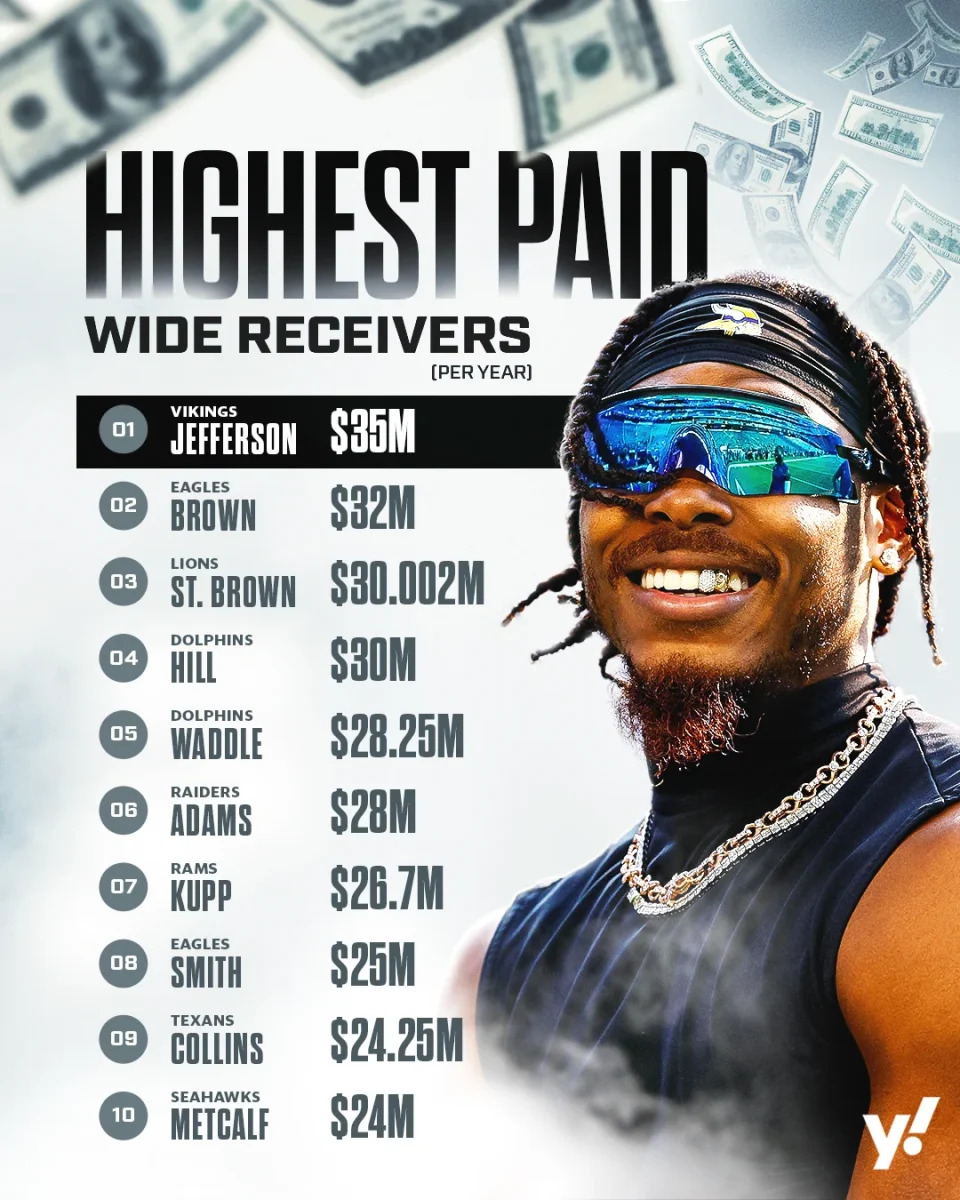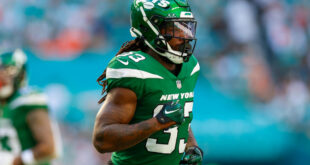There are any number of stats that will show Justin Jefferson had the best first four years of any wide receiver in NFL history. By any standard, the guy is a ridiculously good player.
There is also the basic understanding that defenses must game plan against specifically Jefferson, thus making him advantageously impactful for the Minnesota offense even when the ball isn’t coming his way.
With a new quarterback, J.J. McCarthy, on a rookie deal and entering a season where Las Vegas oddsmakers think the Vikings will finish last in the NFC North, signing Jefferson to a four-year, $140 million contract ($110 million guaranteed) made plenty of sense.
This isn’t to take issue with Jefferson or his contract. Good for him. Good for the Vikings.
That said, the allotment of salary cap to a single player often is calculated by two factors:
A) the premium nature of the position and its impact on the game
B) the supply of talent to fill that demand.
Traditionally, that first criteria has centered on three or four positions — quarterback, edge rusher, left offensive tackle (to protect the quarterback) and shutdown cornerback. Even then, the values fluctuate.
This embedded content is not available in your region.
There is no surviving without a quarterback. Everything else is secondary. No one in Kansas City is regretting allocating, per Spotrac.com, 16.6% of the team’s 2023 salary-cap space on Patrick Mahomes. If anything, it was a bargain.
The Chiefs are prepared to use 24.24 percent, 23.48 percent and 20.71 percent on Mahomes during the 2025-2027 seasons.
Mahomes, however, is both the best player at the most impactful position and also the best player at the most impactful position that lacks alternatives — namely good, let alone great, replacements. There aren’t 32 good quarterbacks in the world. You can look at the bottom of the standings to see what teams don’t have one.
Simply put, if you don’t have a great quarterback, you can’t win. And, of late, if you don’t have Mahomes you can’t win the Super Bowl. So you pay.
Wide receivers are totally different, which is why especially in an era of advanced analytics and multiple generations beyond the concept of Moneyball placing numerical value on nearly everything in sports (especially money), the Jefferson deal and the receiver money boom it represents is startling.
And perhaps temporary. We’ll see.
Jefferson’s $35 million per-year deal makes him the highest paid non-quarterback in NFL history (at least for now). It is part of an offseason that saw huge deals for fellow receivers A.J. Brown ($32 million per year in Philadelphia), Amon-Ra St. Brown ($30 million in Detroit) and Jaylen Waddle ($28.3 million in Miami).
Dallas and CeeDee Lamb are now on the clock and could challenge Jefferson’s number.


Jefferson’s cap hit in Minnesota will be 13.39 percent in 2026, 13.87 percent in 2027 and 14.15 percent in 2028. It’s likely the salary cap will increase by those later years (it is already up to $255.4 million for 2024), but still, that’s a lot of resources for a single wide receiver.
As brilliant as Jefferson has been, he’s averaging just 6.53 receptions a game in his career. That isn’t to discount the 30 touchdowns or the 98.31 receiving yards per game or how he opens up the Vikings’ run game or other receivers.
Still, how many of those 6.53 receptions could Justin Jefferson and only Justin Jefferson make? In other words, how much more productive is he than the next receiver — the old Value Over Replacement Player?
A QB has the ball in his hands nearly every offensive play. An elite left tackle plays all three downs and is involved on every play.
The Vikings think he’s worth it and Jefferson is such a unique performer he very well might be. What about all of these other wide receivers though?
The NFL once placed enormous value on running backs only to realize that the supply of good ones outstripped demand. An incomparable talent such as Derrick Henry or a multipurpose weapon such as Christian McCaffrey may still command a premium, but that’s about it. Most teams would prefer three lower-paid guys to share the load and remain fresh, than one bell cow who could always get knocked out by injury like the old days.
As a result, running backs now command the fourth-lowest average salary ($1.8 million) in the NFL per Spotrac, ahead of just fullback ($1.7 million), punter ($1.5 million) and long snapper ($1.1 million). And just six teams enter the 2024 season with more than 4.3 percent of their cap space dedicated to the position. Last season’s Super Bowl featured the 49ers, who spent 2.65 percent of their cap on the position with McCaffrey, and the Chiefs, who clocked in at 2.06 percent.
Football is being flooded with great receivers right now. Maybe it’s the proliferation of 7-on-7 football at the youth level, where wideout is highly valued. Maybe it’s great athletes shying away from running back. Maybe it’s the pass happy college game. Maybe it’s just cyclical.
Whatever it is, a record seven wideouts were taken in the 2024 NFL Draft’s first round. The 2020-23 average was 5.25. That’s way up from the 3.4 first rounds taken from 2010-19.
Even then, you can find young wide receivers all over the draft. San Francisco’s Deebo Samuel was a second-rounder. Detroit grabbed St. Brown in the fourth round. The Chiefs found Tyreek Hill in the fifth, the same place the Los Angeles Rams landed Puka Nacua a year ago.
How many teams will look at the rising salaries and think they can get a replacement cheap?
Kansas City traded Hill and still won two Super Bowls. Of course, in 2022, Tennessee traded A.J. Brown for the 18th pick in the draft, used it on wideout Treylon Burks and seemingly, at least thus far, regretted it.
There is no one way to build a roster. Perhaps paying wide receivers huge money is the new way. Or perhaps this is just a curious blip on the Moneyball radar.
 Ferdja Ferdja.com delivers the latest news and relevant information across various domains including politics, economics, technology, culture, and more. Stay informed with our detailed articles and in-depth analyses.
Ferdja Ferdja.com delivers the latest news and relevant information across various domains including politics, economics, technology, culture, and more. Stay informed with our detailed articles and in-depth analyses.
